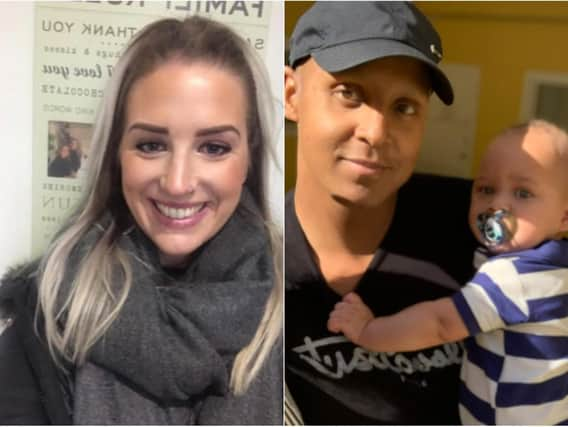Leeds Teaching Hospitals NHS Trust has 34 per cent drop in cancer diagnostic scans through Covid year


From April to September in 2019, Leeds Teaching Hospitals NHS Trust conducted 428840 diagnostic scans which compares with 280100 having been done in the same timeframe this year.
That’s a difference of -148740 scans and a reduction of 34.68 per cent between the two years in Leeds alone.
Advertisement
Hide AdAdvertisement
Hide AdA 34-year-old from Moortown whose scan was cancelled in March told the YEP how she was not diagnosed until four months later and is now undergoing chemotherapy for stage-four lymphoma.
She said: "It’s so unfair. A lot of cancer patients I know have suffered because Covid has caused so much stress to the NHS.”
In the whole of England between April and September in 2019, 103 trusts across England carried out 13.5 million scans of all types, including MRI, CT scans and ultrasounds used to diagnose cancer.
In the same time period in 2020, just 9.1 million scans were carried out which marks a 33 per cent drop of 4.4 million scans.
Advertisement
Hide AdAdvertisement
Hide AdThe whole of the North East and Yorkshire saw the biggest decline, with a difference of over 856,780 scans.
A father-of-two from Leeds had to "beg" to get an MRI scan because of the Covid-19 crisis and has now died of cancer.
The 27-year-old went to hospital on March 23 suffering from leg pain but despite repeated visits he was only given a course of antibiotics for a misdiagnosis of prostatitis.
While the NHS and professional bodies say hospitals were forced to cancel elective appointments to limit patients in wards, the pandemic has exposed flaws in the health service’s ability to diagnose serious conditions early, experts say.
Advertisement
Hide AdAdvertisement
Hide AdTwo top radiologists have said a historical lack of staff as well as a shortage in CT and MRI scanners has been “exacerbated” by Covid-19.
Dr William Ramsden, vice president of the clinical radiology faculty for the Royal College of Radiologists (RCR) and children’s radiologist at Leeds Children’s Hospital, said: “I think the main problem was that the routine work was cancelled.
“We were all asked to concentrate on the Covid work, quite naturally.
“Thus we stopped getting so many referrals and there was less work coming through than would normally be expected.
Advertisement
Hide AdAdvertisement
Hide Ad“I work in a big children’s hospital - we obviously saw urgent cases and people that were really poorly, but that normal work just didn’t come.
“There are two issues there - first of all we have an aging equipment base.
“When you have aging equipment, it’s more susceptible to break down, it needs more maintenance.
“In the autumn spending review, there was more money promised for equipment, which is really welcome.
Advertisement
Hide AdAdvertisement
Hide Ad“Also if you work in small places, particularly rural hospitals, you might only have one scanner.
“Then the problem is - how are we going to fit in people with Covid and other serious health conditions?
“As time went on, they brought round scanners on vans to help some of the smaller places.”
The scan numbers are combined from figures for the nine common diagnostic imaging tests carried out in the UK as defined in the Diagnostic Imaging Dataset, released monthly by NHS England.
Advertisement
Hide AdAdvertisement
Hide AdThese include Computerized Axial Tomography (CT); Diagnostic Ultrasonography; Fluoroscopy; Magnetic Resonance Imaging (MRI); Medical Photography; Nuclear Medicine Procedure; Plain Radiography; Positron Emission Tomography (PET); Single Photon Emission Computerized Tomography.
Dr Ramsden added: “Where I work in Leeds we have used part of the Nightingale Hospital in Harrogate - that’s been used as a cold scanning hub to keep people safe from Covid.
“The other recommendation is for community diagnostic hubs where you actually have permanent facilities out in the community, away from acute hospitals, where people can be scanned safely without coming into contact with Covid.
“The people that want this seem to be getting on with the planning at a good pace - what will decide how quickly we get them is funding.
Advertisement
Hide AdAdvertisement
Hide Ad“If you have a workforce issue, staffing a big hospital and a community hub will be quite tough.
“Long term we need to increase the workforce - that’s been recommended by two major reports.
“Every year we are oversubscribed in terms of applicants wanting to become a radiologist. We can train more if we are funded to train more.
“It takes five years to train a radiologist, so we have to think about the short term as well.
Advertisement
Hide AdAdvertisement
Hide Ad“Things such as Covid vaccination may help; we may be able to get back to working faster. But in the short term we might think of imaging networks.
“This is about connecting all X-ray departments electronically, which means people could report other people’s cases if they have the capacity.
“That’s a rare thing these days and will not save us - but it might allow for home working and try and beat down the backlog.”
In September 2019, the government pledged an extra £200m towards new MRI and CT scanners. At the time the UK had the lowest number of both CT and MRI scanners per capita among the EU15 and G7 countries - less than a third of that in Germany.
Leeds Teaching Hospitals NHS Trust was contacted for comment.